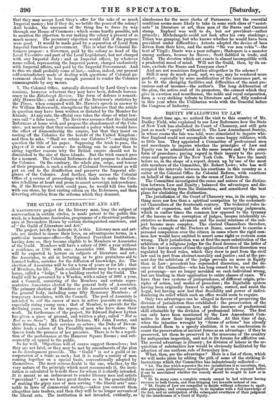THE GUILD OF LITERATURE AND ART.
A niAnNmeEacr project for the literary man, long the subject of conversation in certain circles, is made patent to the public this week, in a handsome fasciculus, programme of a theatrical perform- ance at Devonshire House by certain distinguished amateurs, and of " the Guild of Literature and Art."
The project, briefly to indicate it, is this. literary men and art- ists are invited to insure their lives, on advantageous terms, in a particular insurance-office—the National Provident Institution ; having done so, they become eligible to be Members or Associates of the Guild. Members will have a salary of 2001. a year without a residence, or 1701. with one ; Associates 1001. The Members will be expected to lecture on subjects of literature and art ; the Associates, to aid in lecturing, or to give gratuitous aid to learned bodies, societies for the diffusion of knowledge, &c. The election of Associates will be for a term of years or for life ; that of Members, for life. Each resident Member may have a separate house, called a "lodge," in a building erected by the Guild. The Guild will be governed by a Warden, with a salary of 2001. a year, and a Council, consisting of the Members and certain repre- sentative Associates elected by the general body of Associates.
The prl • election of Members or life Associates will rest with the general body, including some fifty Honorary Members ; of temporary Associates, with the Council. The post of Associate is intended to aid the career of men in active pursuits or studies, especially rising young men ; that of Member, to provide for the declining years, or for the repose, of men who have done their work. In furtherance of the project, Sir Edward Bulwer Lytton has given a piece of ground, and written a play, called "Not so Bad as we Seem"; Mr. Charles Dickens, Mr. John Forster, and their friends, lend their services as actors ; the Duke of Devon- shire lends a saloon of his Piccadilly mansion as a theatre ; the Queen lends the promise of her presence. There is to be a repeti- tion of the performance at the Hanover Square Rooms ; and sub- sequently an appeal to the public. So far well. Objections will of course suggest themselves ; but they are not fatal, or they may be met by amendments of the plan as its development proceeds. The " Guild " is not a guild or in- corporation of a trade as such ; but it is really a society of men coming together on a special basis, conventionally adopted by themselves. The most serious doubt is the one, whether, by the very nature of the principle which most recommends it, the insti- tution is calculated to benefit those for whom it is chiefly intended. It is meant as an inducement to render literary men and artists " provident" : now we have great doubts as to the practicability of making the gipsy race of men serving "the liberal arts" ame- nable to laws of commercial society,—unless you convert them altogether into traders, and then they will be no longer servants of the liberal arts. The institution is not intended, evidently, as almshouses for the mere clerks of Parnassus ; but the essential condition seems more likely to take in some such class of " assist- ants " in literature or art, than men of the Burns and Carracci stamp. Raphael was well to do, but not provident—rather princely; Michelangelo could not look after his own stockings ; Titian was grasping, but who knows whether he would have been provident under difficulties ; Ariosto adopted the device of bees driven from their hive, and the motto " Sic vos non vobis "—the text of Virgil ; Dante was a poor refugee ; Shakspere is a monster among authors, because he throve ; Scott dabbled in trade, and failed. The devotion which art exacts is almost incompatible with a prudential mood of mind. Will not the Guild, then, by its na- ture, exclude the Burns and Tennyson class ?
And are not musicians forgotten altogether in the scheme ? Still it may do much good, and, we say, may be rendered more perfect; especially by some modification of the insurance part, so as to fit the changing facilities and difficulties of the most pre- carious sort of incomes—the author's. The long deliberation of the plan, the active zeal of its promoters, the earnest which they give in exertion and munificence, the noble and royal cooperation, form a very striking tribute to literature and art, fitly rendered in this year when the Utilitarian weds with the Graceful before the Congress of Industry.


























 Previous page
Previous page